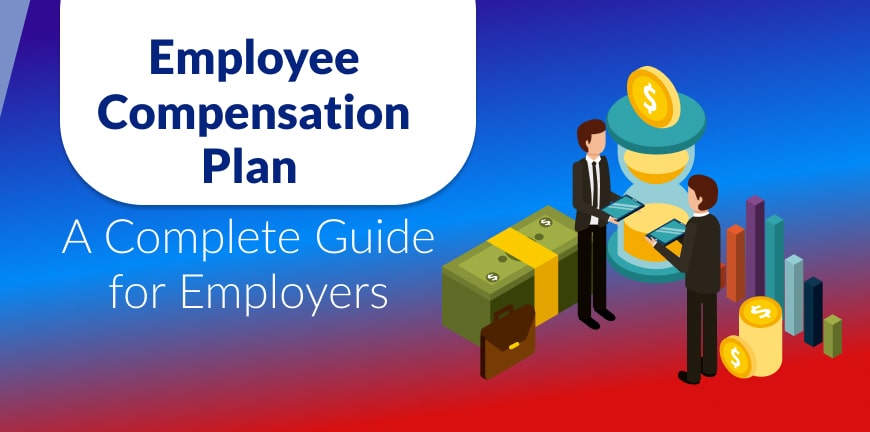
Top 5 Industries in Japan Hiring Japanese-Speaking Indians
02/06/2025
Difference Between Internal and External Recruitment
02/06/2025- Introduction
- What is an Employee Compensation Plan?
- Why is an Effective Compensation Policy Important?
- What are the Key Components of an Employee Compensation Plan?
- i. Direct Compensation
- ii. Indirect Compensation
- iii. Other Components
- What are the 5 Steps to Create an Effective Employee Compensation Plan?
- How to Measure the Effectiveness of Your Compensation Plan
- What are the Challenges in Compensation Plans and How to Overcome Them
- Conclusion
- Frequently Asked Questions (FAQs)
Introduction
The right employee compensation plan can help attract and retain high performing talent. While the main attraction remains pay and benefits for employees, an effective compensation plan includes more than that.
Apart from the traditional compensation, employees have been increasingly looking for benefits like career development, rewards, and recognition in recent years along with competitive pay. The right compensation plan must be in place to ensure that employees stay loyal, motivated, and engaged in the workplace. In this article, we will be exploring the types, benefits, and best practices of an employee compensation plan.
What is an Employee Compensation Plan?
An employee compensation plan refers to a policy developed by a company that determines how employees are paid salaries, wages, bonuses, benefits, and incentives based on their experience, qualifications, and the role they are working in. An effective compensation policy is important to attract, retain and motivate employees while ensuring they are fairly paid.
Why is an Effective Compensation Policy Important?
An effective compensation policy ensures that employees are compensated fairly and in turn keeps them motivated, loyal, and engaged at the workplace leading to higher employee retention rates.
1. Ensures fair pay
Compensation policies are in place to ensure all employees are paid fairly including compensation and other benefits. Compensation usually has other variables as well, and a policy can help streamline the process to ensure fair pay. A compensation policy helps employers decide their budget in advance and plan accordingly.
2. Help in staying competitive
A compensation policy allows employers to understand the current salary benchmarks in the market. By paying competitive salaries when compared to other companies, you can attract top talent.
3. Better engagement and retention rates
When you treat your employees fairly and compensate them well, meaning as much as their work quality deserves, they are motivated to perform better. A good compensation policy can lead to better engagement, productivity, loyalty resulting in lower retention rates.
4. Align work done by employees with business goals
A well-crafted compensation policy helps employees understand how their work contributes to the company goals and objectives. For example, when companies tie monetary rewards directly to business accomplishments, employees better understand how their job performance helps the business achieve goals.
What are the Key Components of an Employee Compensation Plan?
The key components of an employee compensation plan are essentially divided into two categories, direct and indirect compensation. Under the direct compensation, the monetary part is included and under the indirect compensation the incentives that are non-monetary are included.
There are three types of compensation plans and under each of them there are different types of compensation included.
i. Direct Compensation
1. Base Salary
A fixed compensation that is paid to acknowledge an employee’s work which excludes bonuses, allowances, and other benefits. This element is determined based on factors like job role, experience, and education.
2. Bonuses
Based on how exceptionally employees perform, a one-time payment is made other than the regular compensation itself.
3. Stocks
Stock options are granted to employees as part of their compensation plan in many organizations. This motivates employees to do better and align their work with the interests of the company’s success.
4. Overtime Pay
If an employee is working for an extended number of hours in a day than the minimum hours required, then he is to be paid accordingly for these hours.
ii. Indirect Compensation
1. Benefits
Benefits refer to the extra incentives paid to an employer that may not be monetary. Some benefits include retirement plans, paid time off, healthcare etc, all of which help make employees feel valued and enhance their overall wellbeing.
2. Perks
Additional benefits such as flexible work arrangements, company cars for business or personal use, free meals, tuition reimbursements, employee discounts etc. complement the compensation package, enhancing the overall work experience.
iii. Other Components
1. Regular reviews
It’s important to review your compensation policies from time to time to know how effectively they are working and make changes according to the current market and industry trends and priorities. Evaluation of performances enable employers to see how employees have contributed to the organisation and compensate them accordingly.
2. Legal Compliance
Compliance with relevant laws and regulations is an absolute must when it comes to compensating employees in an organization considering all factors like minimum wages, overtime pay, anti-discrimination legislation.
3. Training and development
As mentioned earlier, a compensation package is no more just about monetary incentives but must also contain other perks like providing and training and development opportunities in the form of workshops, webinars etc to give employees a push in the career growth.
An employee compensation policy is designed keeping in mind the interests of employees. Some of the main factors considered while designing it are salary structure, incentives, benefits, pay equity etc., all of which can help create a framework that aligns with company goals and objectives.
What are the 5 Steps to Create an Effective Employee Compensation Plan?
An employee compensation policy must be designed by keeping in mind the best interests of the employees as well as the organization.
Here are some of the best practices for crafting and managing compensation plans-
1. Be clear on what you need on your compensation policy
- Your compensation structure must align with the company’s overall objectives which is attracting and retaining top talent, enhanced performance, and remain competitive.
- Have the right principles regarding pay equity, how to pay based on performance as well as being mindful of market rates.
- Gather input from stakeholders, HR, as well as employees while crafting an employee compensation policy to ensure everyone is on the same page.
2. Market Research
- Before deciding on the compensation structure make sure to conduct thorough research about salary benchmarks and how competitors are paying for the roles that you are looking to hire individuals for
- See the differences in cost of living from region to region while setting pay ranges
- Ensure your compensation plan complies with all relevant laws and regulations related to fair pay
3. Design pay structure
- Design salary structure keeping in mind the experience and responsibilities of employees
- Consider market data before defining the salary range you want to set
- You must incorporate the culture of giving bonuses, compensating for overtime work to ensure your employees feel valued and motivated
- Incorporate a benefits package that includes retirement benefits, paid time off and other perks.
4. Legal Compliance
- Make sure you have taken the right steps to establish policies and procedures to pay for the work done and not based on factors like gender and other characteristics
- Maintain compliance with minimum wage laws, overtime and ensure the employees are paid accordingly
- Maintain proper documentation of everything including job description, salary ranges and performance evaluation criteria.
5. Communicate
- Make sure you let your employees know about the compensation plan clearly. Explain to them why you have this compensation structure
- Offer proper training to managers to implement the compensation plan and explain the same to their teams.
- Review your compensation plan and make changes to it based on the current market trends, and organizational goals.
How to Measure the Effectiveness of Your Compensation Plan
To know how well your compensation plan is working for your organization and employees it’s essential to consider certain metrics like turnover rates, salary range adherence, how satisfied your employees are etc. Some of the metrics you can consider to effectively measure your compensation plan are-
1. Turnover rates
Looking into your company’s turnover rates can give you an idea about how satisfied or dissatisfied your employees are with the compensation and benefits package,
2. Adhering to a salary range
Take a look at how many employees fall within salary ranges you have set for their roles. This will give you an idea if you are ensuring pay equity, or if you are overpaying or under paying them.
3. Market standards
Benchmarking the compensation plan against industry standards is essential if you want to stay competitive and attract top talent with handsome compensation packages.
4. Employee satisfaction
Ask your employees, gather feedback as to what they think about the salary packages and benefits they are offered. This will give you an idea about where you can improve your standards.
5. Cost of compensation
Figure out how much you are spending on salaries including direct and indirect compensation as a percentage of revenue or profit to know if effect on the organization.
6. Total compensation
Know exactly how much you are allocating to compensation including salary, benefits to compare it against market standards and employee preferences.
7. Pay fair wages
According to industry standards make sure you pay your employees fairly and pay them what other companies are paying for the same roles and experience levels.
What are the Challenges in Compensation Plans and How to Overcome Them
Balancing compensation plans while offering competitive compensation can be quite challenging for most organizations. Some of the common challenges in compensation plans and solutions to overcome them are as follows-
1. Lack of financial resources
Smaller companies usually do not have proper budget allocations when compared to the bigger corporations. This makes it difficult to offer competitive pay.
Solution: You can try offering them non-monetary benefits like flexible work hours, training on subjects they want to learn about and fostering a positive work culture.
2. Stay competitive in the market
Keeping up with competitors’ compensation packages is very challenging as the market standards constantly change and keeping up with it is difficult.
Solution: Benchmark your compensation packages against industry standards and adjust them accordingly. Utilize market data and salary surveys to stay informed about the latest trends and ensure your compensation remains competitive.
3. Offering variables along with base pay
It’s important to balance fixed wages and variable pay based on performance. Failing to do so can lead to employee dissatisfaction and turnover.
Solution: Have a balanced compensation structure that includes both fixed and variable pay components. Make sure the rewards are given based on performance
4. Cost of living adjustments
Due to inflation, cost of living in certain cities can change drastically that creates an issue in paying employees as before, making it difficult for organizations to pay them competitively and retain them.
Solution: Make sure to review your compensation packages constantly by accounting cost of living changes. This can help in pre-planning budget and ensure competitive pay for employees.
Conclusion
It’s essential for employers to ensure fair compensation packages for employees based on market standards, the location they are in, which role they are working in, while complying with laws and regulations of employment.
Employers can easily offer competitive compensation packages to their employees by working with a dedicated benefits partner like Alp Consulting. With our compensation, benefits and compliance solutions, businesses can create a proper employee compensation plan to support their employees.
Frequently Asked Questions (FAQs)
1. What is an employee compensation plan?
An employee compensation plan is a structured pay policy that lays out the rules and regulations as to how the employees must be paid. This includes their wages, bonuses, benefits, and incentives. It’s a thorough strategy that enables employers to pay employees based on their skills and experience.
2. Why does a compensation plan important for employers?
An effective compensation plan ensures that employees are compensated fairly and in turn keeps them motivated, loyal, and engaged at the workplace leading to higher employee retention rates.
3. How often should compensation plans be reviewed?
It’s important to review your compensation policies from time to time to know how effectively they are working and make changes according to the current market and industry trends and priorities.
4. Can compensation plans include non-monetary benefits?
Yes, there is a category called indirect compensation which includes non-monetary benefits like insurance policies, paying for education, medical benefits, paid leaves and more.
5. What is the difference between compensation and benefits?
Compensation is basically what an employee is paid by an organization for the work they do, and this is monetary compensation. Benefits are other perks and rewards that employees get as part of the package that could include retirement plans, flexible work arrangements, paid leaves, training, and development opportunities.
6. How do you measure the success of a compensation strategy?
To know whether or not your compensation strategy is working effectively, you must consider some factors like- how well are you adhering to salary rangers, are your employees satisfied or not, are your turnover rates high or low.
Contact Us For Business Enquiry

Hariharan Iyer
Hariharan Iyer is the Vice President – Operations at ALP Consulting, bringing over 40+ years of experience in HR outsourcing and labour law compliance. He leads end-to-end HRO operations, ensuring process efficiency, statutory compliance, and seamless service delivery for clients across industries. With a strong background in labour law governance and workforce management, Hariharan plays a key role in driving operational excellence and compliance-led HR solutions at ALP Consulting.




